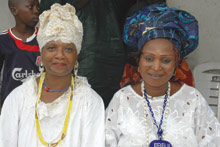There’s a story from the Yoruba people of Nigeria, and to hear Valeria Watson-Doost tell it, it goes something like this:

“Eshu is a trickster. If you’re not paying attention, he’ll trick you,” she says. “There are these two farmers on either side of a road. So Eshu wears this hat: One side’s red and one side’s black. He walks down the road between the two. So one of the brothers says, ‘Did you see that guy with the black hat?’ and the other says, ‘No, I saw a guy with a red hat.’ The other replies, ‘Oh no, no, no, the guy had a black hat.’ Of course, they get into a big fight and destroy everything.”
She laughs and continues: “The whole point being, to pay attention. Things appear the way they are from a vantage point, and perhaps it might be beneficial to look from another point of view.”
That philosophy has motivated Watson-Doost to undertake extensive work abroad. Also known as Yeye Siju Osunyemi, she traveled over to Osogbo, Nigeria, in 2006 to be initiated as a priestess of Osun in the Yoruba indigenous religious tradition.
“The deities are very different from our Western ones—they’re very powerful archetypes,” she says. “Osun is fresh water; she’s eroticism, healing, motherhood.” The sacred grove of Osun, a UNESCO World Heritage site, is on the outskirts of Osogbo, a city of 845,000 in the south of the country.
Before embarking on her 2006 trip, Watson-Doost requested, and received, a letter from Asheville Mayor Terry Bellamy asking if Asheville and Osogbo could become sister cities. In August of last year, she returned to Osogbo, leading a delegation from Asheville to formally sign the agreement.
“This was unique, as most people that do work in Africa come through a Christian or Muslim organization,” she says. “That’s where all the money is—the indigenous people are at the low end. It really brought some prestige to the indigenous people to bring over these people from the United States. We went during the Osun festival and got an inside view. It’s interesting [that] in the public ceremonies they’ll do a Muslim prayer, a Christian prayer and a traditional prayer.”
Along with her husband, documentarian Rainer Doost, Watson-Doost has also set up a nonprofit foundation, the Zamani Refuge African Cultural Center, dedicated to “bridging cultural divides through education and cultural exchange.” The group, which is not exclusively religious in nature, is also working to create educational opportunities for Nigerians in the area. Projects range from equipping Osogbo’s library with Internet-linked computers to giving locals the equipment to expand their businesses to putting programs on Asheville-based URTV.
“It’s a poor country; there’s a lot of corruption, and it can be very dangerous,” Watson-Doost says. “But there’s a new paradigm in aid: It’s more the ‘teach someone to fish’ model, because the old charity model breeds dependency. We realize those people have something wonderful to give us too: their culture, their ancient art tradition. Perhaps that’s something they can teach us. My dream is that we can have an Osun festival in Asheville.”
Watson-Doost is looking for recruits for her next trip to Osogbo. She puts out a call, “Hey, Asheville, anyone want to go to Africa?”
Info: Zamani Refuge African Cultural Center, 58 E. Wonder Road, Leicester NC 28748 (or 828-515-0740; www.zamanirefuge.org or www.osunpriestess.com).



Before you comment
The comments section is here to provide a platform for civil dialogue on the issues we face together as a local community. Xpress is committed to offering this platform for all voices, but when the tone of the discussion gets nasty or strays off topic, we believe many people choose not to participate. Xpress editors are determined to moderate comments to ensure a constructive interchange is maintained. All comments judged not to be in keeping with the spirit of civil discourse will be removed and repeat violators will be banned. See here for our terms of service. Thank you for being part of this effort to promote respectful discussion.